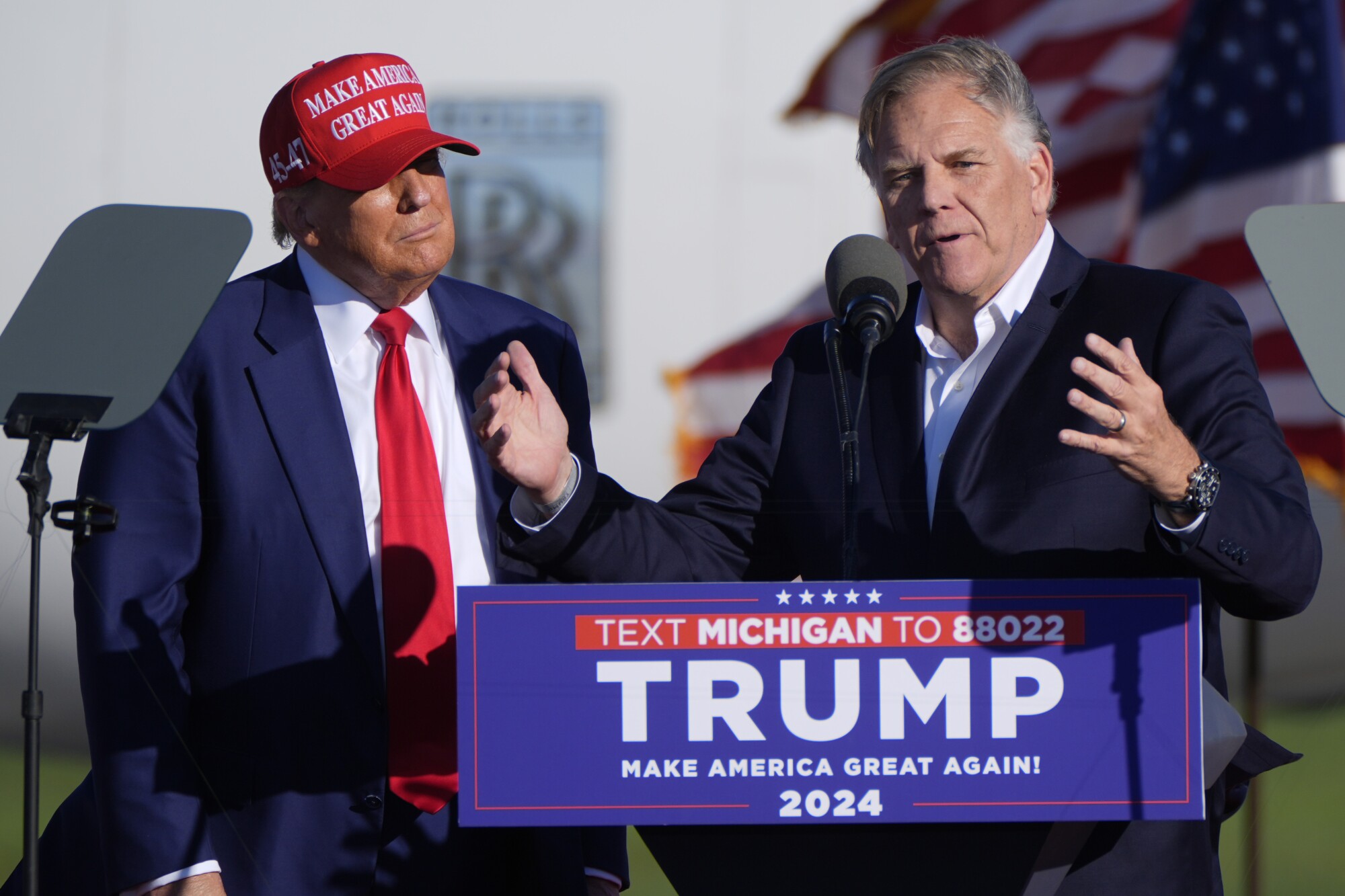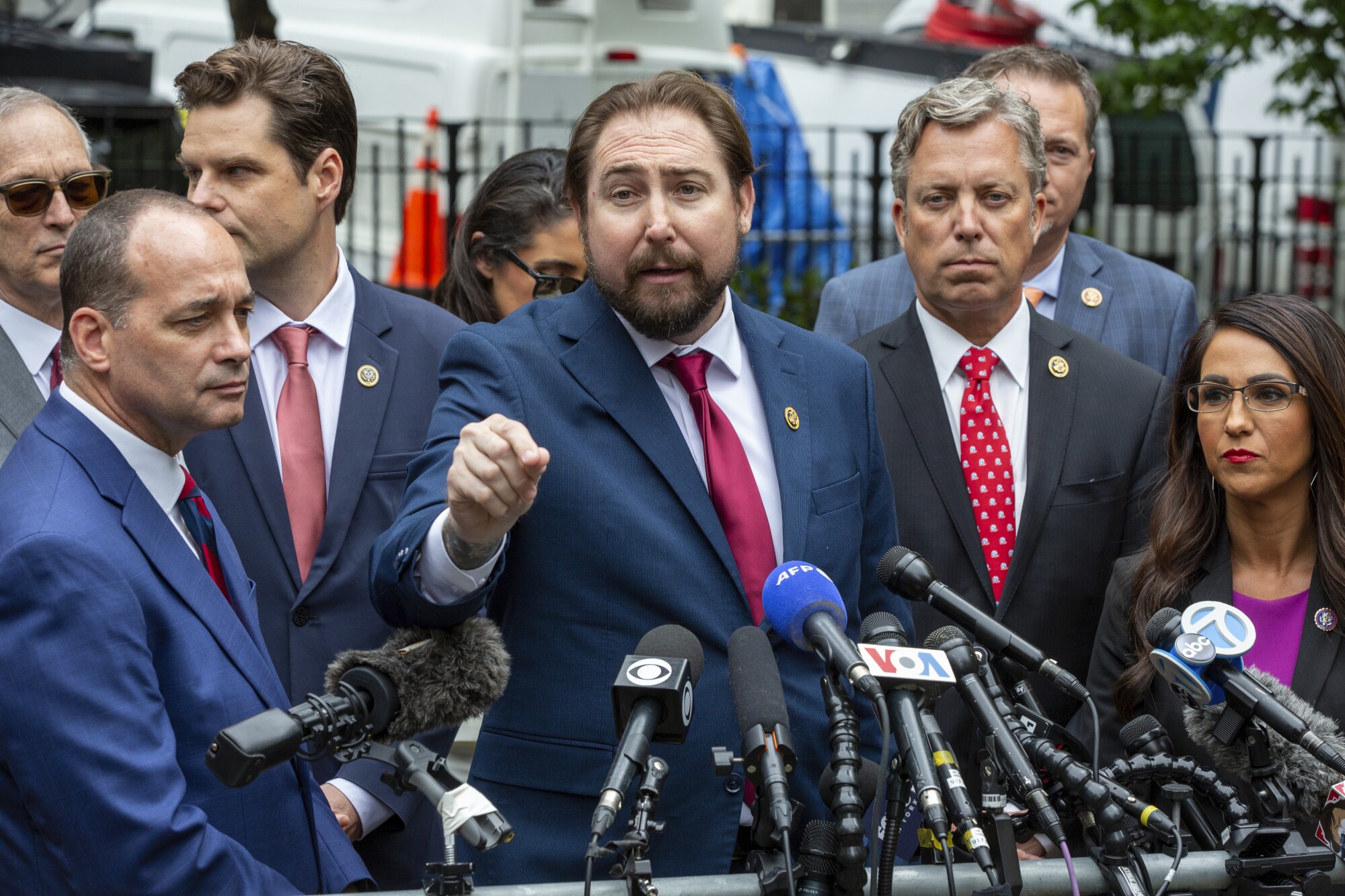For years now, Republicans have smothered Donald Trump in compliments, made pilgrimages to Mar-a-Lago and even sorted out his favorite Starbursts as personal gifts — all to win four of the most sought-after words in Republican politics: “Complete and Total Endorsement.”
Trump’s seal of approval is often the difference in GOP primaries, with Trump’s endorsement record in primaries standing at 93% in 2022 and 97% in 2020. (His general election success rate is far lower: 83% in 2022 and 78% in 2020.) But this year, flattery seems to be factoring less into Trump’s endorsements than electoral viability. And the former president’s decisions are raising eyebrows — and blood pressures — in far-right circles.
In the case of House Freedom Caucus Chairman Bob Good, Trump’s endorsement seems to come down to two things: viability and, more than anything, vengeance.
Good initially endorsed Florida Gov. Ron DeSantis for president, not on account of any real policy difference but because he said he wanted someone who could serve for two consecutive terms. Good endorsed Trump as soon as DeSantis dropped out, but it wasn’t enough to quell Trump. The former president is backing the HFC chair’s GOP opponent, Virginia state Sen. John McGuire, in the primary election Tuesday.
All the same, Good is running for reelection in Virginia while touting himself as a close Trump ally. His stump speeches point to Trump as the answer to all of America’s woes, and his campaign signs are plastered with Trump’s name. McGuire, meanwhile, has pointed out in his campaign signs that he is the one who Trump endorsed, not Good.
“John is running against Bob Good, who’s not good, despite his name,” Trump said Monday night during a teletownhall.
While plenty of Freedom Caucus members have issues with Trump backing a challenger to the HFC chairman, hardly anyone wanted to talk on the record about it — even though it’s been a common point of discussion among members.
“Generally, there is a belief that President Trump is endorsing a whole bunch of squishes across the country,” one source familiar with the Freedom Caucus’ thinking told NOTUS on Monday, claiming that Trump backing McGuire over Good was “part of that pattern of endorsing people who are more like Mike Rogers than Donald Trump.”
Trump’s endorsement of former Rep. Mike Rogers for Senate in Michigan also raised alarm bells for conservatives, sources told NOTUS, recalling Rogers’ avid support of the surveillance state as the House Intelligence Committee chairman.
Still, conservatives seem to understand Trump’s endorsement of Rogers; he’s clearly the most viable Republican in the race, and no one expected the former president to back former Freedom Caucus member Justin Amash after Amash — a former Republican lawmaker who became an independent and then a Libertarian — supported an impeachment inquiry into Trump in 2019.
The endorsement of McGuire, however, truly did irk them, even though Trump allies said it shouldn’t have come as a surprise.
“Trump is the GOP nominee for president and is in cycle, so obviously he is going to endorse the members of Congress who endorsed his presidential campaign during the primaries,” one Trump ally told NOTUS. “Inversely, he’s probably not going to support the campaign of the members who endorsed against him. Bob Good may be a good conservative, but if he didn’t want Trump to endorse against him, he shouldn’t have endorsed against Trump.”
But some Freedom Caucus members think Trump’s endorsement strategy could backfire on the former president, arguing that the Republicans the former president is helping to get elected are the types who will abandon him when the going gets tough.
“Should the president win reelection, I think he will learn to regret having chosen some of the people he’s endorsed,” Rep. Chip Roy of Texas, who also initially backed DeSantis, told NOTUS. “Who will be in the foxhole with you when you’re wanting to actually try to challenge the swamp? If you want to drain it, then you should drain it.”
(Trump tried to recruit a primary challenger for Roy, but he called for a candidate to take on Roy a week after the filing deadline in Texas. Roy won his primary unopposed.)
Rep. Eli Crane of Arizona, another member of the Freedom Caucus, said Trump has earned the right to “endorse whoever the hell he wants,” but he did acknowledge that he “doesn’t always agree with his endorsements.”
The list of endorsements that far-right members could disagree with this year is long. Trump crucially backed businessman Tim Sheehy over Freedom Caucus Rep. Matt Rosendale in a Montana Senate primary, despite pressure from Rep. Matt Gaetz and others to support Rosendale. Trump also endorsed relatively moderate Republican Rep. Mike Bost over far-right candidate Darren Bailey in Illinois. And Trump offered his backing to Rep. William Timmons, who was up against the leader of the South Carolina Freedom Caucus, Adam Morgan, in a race that NBC News called a “proxy war for ongoing GOP divisions.”
Trump backed Timmons, and Timmons won by 3% — or 2,000 votes.
Days after he beat his challenger from the right, Timmons promised to dedicate his time to ousting Good. Over the weekend, Timmons led a charter bus full of congressional staffers and interns from Navy Yard down to Virginia’s 5th Congressional District to door-knock for McGuire.
“I’m down here supporting John McGuire, but really, I’m down here supporting President Trump,” Timmons told NOTUS. “Because we have to get our country back on track in January, and we got to win in November. But most importantly, when Trump’s in the White House, he needs to have people in Congress that he can work with that he trusts. And he does not trust Bob Good. Quite the opposite. He explicitly distrusts Bob Good.”
Just as Timmons had no love lost for Good, establishment Republicans were also unsympathetic to Freedom Caucus concerns about Trump’s endorsements.
“The real story here is that these guys throw a temper tantrum every time Trump endorses against their preferred candidate,” a senior GOP aide told NOTUS, “where most of the time their preferred candidate is a total shitbag.”
Other lawmakers also saw no problem with Trump backing candidates who have strong chances of winning over just the most conservative Republicans.
“Trump is what conservatism is,” Rep. Max Miller of Ohio, who was also a former aide to Trump, told NOTUS. “He wants to win and make the right type of progress. He sees who the phonies are, and he’s making the right selections for the entire country.”
How Trump is making his selections is a bit of intrigue. He regularly consults with his senior political advisers — Chris LaCivita and Susie Wiles, for starters — and takes input from Speaker Mike Johnson and National Republican Congressional Committee Chairman Richard Hudson. Both Johnson and Hudson have met with Trump at Mar-a-Lago multiple times in recent months — the three met together on Monday as well — to talk about the election field.
As much heartburn as conservatives seem to have over Trump’s endorsements, time will tell if his strategy of emphasizing electoral viability is a smart one. Republicans working on the races think he’s broadening the field.
“I can’t think of an endorsement in a competitive House seat that he’s made that isn’t helpful,” said one GOP strategist. “He is allowing Republicans to put seats in play with smart nominees; he understands it’s not a large battlefield, and we can’t afford to have vulnerable nominees.”
—
Reese Gorman is a reporter at NOTUS.




